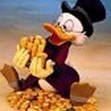"January effect" para Marco e Ulisses
8 mensagens
|Página 1 de 1
Claro Marco....
....perfeitamente de acordo!!
grande abraço
grande abraço
scuba
Fear blind us the opportunity, greed blind us the danger!
Fear blind us the opportunity, greed blind us the danger!
- Mensagens: 1300
- Registado: 10/11/2002 1:03
- Localização: 24
Scuba, a primeira vez que li algo sobre o January Effect foi há uns dois anos atrás quando pesquisa na net material sobre Análise Técnica e comecei-me a deparar com papers académicos com estudos estatísticos dos mercados, onde encontrei imensos sobre o (segundo alguns pseudo-) January Effect. Foram essas as minhas primeira fontes (e não agências noticiosas). O facto de ter colocado aqui algumas dessas fontes foi por terem sido as primeiras que me surgiram à mão numa rápida pesquisa...
É claro que se entendes que deves continuar a entender como January Effect aquele outro, tudo bem, Scuba, ninguém te vai impedir. Sublinho apenas que a minha intervenção surgiu pelo facto de teres referido na sequência do artigo do Ulisses que o January Effect não era aquele que ele referiu, quando é. O que não impede que haja outro ou que haja quem também chame January Effect a outra coisa. Em qq dos casos um esclarecimento só me parece algo de positivo, certo?...
É claro que se entendes que deves continuar a entender como January Effect aquele outro, tudo bem, Scuba, ninguém te vai impedir. Sublinho apenas que a minha intervenção surgiu pelo facto de teres referido na sequência do artigo do Ulisses que o January Effect não era aquele que ele referiu, quando é. O que não impede que haja outro ou que haja quem também chame January Effect a outra coisa. Em qq dos casos um esclarecimento só me parece algo de positivo, certo?...
FLOP - Fundamental Laws Of Profit
1. Mais vale perder um ganho que ganhar uma perda, a menos que se cumpra a Segunda Lei.
2. A expectativa de ganho deve superar a expectativa de perda, onde a expectativa mede a
__.amplitude média do ganho/perda contra a respectiva probabilidade.
3. A Primeira Lei não é mesmo necessária mas com Três Leis isto fica definitivamente mais giro.
marco há muita informação....
....e tb desinformação. Eu confio nas minhas fontes e são 2 ou 3 e não milhares.
Agora que os jornais ou agências noticiosas e o público bem como alguns sites populares tenham uma ideia errónea tb não é de estranhar. Como sabemo o público em geral tem uma verdade muito próxima. A raiz e nascimento de determinado conceito muitas vezes são distorcidos para explicações mais simplistas.
Citando o buffet " qd acorda mal disposto lê um jornal financeiro e nada o faz rir tanto. "
O problema é que um mundo dependente dos média e global por veses amplia os erros de tal forma, que chega através de algumas deturpações da realidade a criar novos conceitos e definições!
Marco fica com a tua bina que eu fico com a minha
abraço Marco e cumps á Razão
Agora que os jornais ou agências noticiosas e o público bem como alguns sites populares tenham uma ideia errónea tb não é de estranhar. Como sabemo o público em geral tem uma verdade muito próxima. A raiz e nascimento de determinado conceito muitas vezes são distorcidos para explicações mais simplistas.
Citando o buffet " qd acorda mal disposto lê um jornal financeiro e nada o faz rir tanto. "
O problema é que um mundo dependente dos média e global por veses amplia os erros de tal forma, que chega através de algumas deturpações da realidade a criar novos conceitos e definições!
Marco fica com a tua bina que eu fico com a minha
abraço Marco e cumps á Razão
scuba
Fear blind us the opportunity, greed blind us the danger!
Fear blind us the opportunity, greed blind us the danger!
- Mensagens: 1300
- Registado: 10/11/2002 1:03
- Localização: 24
Em relação à «capacidade» de Janeiro prever/definir o resto do ano, enfim, já tenho visto referências a isso, parece-me relativamente natural que isso aconteça e possivelmente não acontece apenas com Janeiro embora esse mês chame mais a atenção por ser o primeiro do ano. Mas ao fazer uma busca pelo Google para colocar aqui alguns links encontrei uma coisa catita... Um site que nos permite fazer alguns estudos simples deste tipo online, por isso se alguém se quiser entreter e não dispuser de uma BD suficientemente longa, aqui vai (disponibilizam dados sobre o S&P desde a década de 1950, salvo erro):
http://www.moneychimp.com/features/monthly_returns.htm
http://www.moneychimp.com/features/monthly_returns.htm
FLOP - Fundamental Laws Of Profit
1. Mais vale perder um ganho que ganhar uma perda, a menos que se cumpra a Segunda Lei.
2. A expectativa de ganho deve superar a expectativa de perda, onde a expectativa mede a
__.amplitude média do ganho/perda contra a respectiva probabilidade.
3. A Primeira Lei não é mesmo necessária mas com Três Leis isto fica definitivamente mais giro.
January effect
Por acaso a leitura que faço do artigo transcrito pelo Scuba é muito linear. Eu não vejo coincidências, vejo trends plurianuais bulls e bears e vejo relações lineares entre as variações mensais e as variações anuais respectivas.
Mas, desta forma, poderíamos também fazer o mesmo cruzamento com os meses de Fevereiro, Março, Abril, Maio, Junho, etc..., etc... e já agora que estamos com a mão na massa, cruzar igualmente dados trimestrais, quaternais e semestrais.... Bem, nunca mais saíamos daqui e a conclusão seria a mesma, extrapolação....
Ai, o maravihoso mundo da matemática.
De qualquer forma não creio que a varação mensal de Janeiro, só por si seja um factor determinante e explicativo que possa servir de base para uma previsão com 11 meses de antecedência sobre o fecho anual seja de que ìndice fôr.
Isto é a minha humilde opinião.
Cumprimentos bolsistas!
R.P.
Mas, desta forma, poderíamos também fazer o mesmo cruzamento com os meses de Fevereiro, Março, Abril, Maio, Junho, etc..., etc... e já agora que estamos com a mão na massa, cruzar igualmente dados trimestrais, quaternais e semestrais.... Bem, nunca mais saíamos daqui e a conclusão seria a mesma, extrapolação....
Ai, o maravihoso mundo da matemática.
De qualquer forma não creio que a varação mensal de Janeiro, só por si seja um factor determinante e explicativo que possa servir de base para uma previsão com 11 meses de antecedência sobre o fecho anual seja de que ìndice fôr.
Isto é a minha humilde opinião.
Cumprimentos bolsistas!
R.P.
Trade the trend.
Um artigo da CBOE, com uma extensa referência Bibliográfica, sobre factores sazonais, em particular o January Effect:
http://www.cboe.com/micro/rut/Seasonality.asp
Mas uma busca no Google permite-te encontrar centenas de links sobre o January Effect.
http://www.cboe.com/micro/rut/Seasonality.asp
Mas uma busca no Google permite-te encontrar centenas de links sobre o January Effect.
FLOP - Fundamental Laws Of Profit
1. Mais vale perder um ganho que ganhar uma perda, a menos que se cumpra a Segunda Lei.
2. A expectativa de ganho deve superar a expectativa de perda, onde a expectativa mede a
__.amplitude média do ganho/perda contra a respectiva probabilidade.
3. A Primeira Lei não é mesmo necessária mas com Três Leis isto fica definitivamente mais giro.
Scuba, volto a referir que esse não é o January Effect que comummente é referido e como é vulgarmente entendido. O January Effect tem vindo a ser analisado em todos os mercados e consiste numa tendência de subida anormal nas primeiras semanas do ano. Existem centenas de papers académicos inclusivamente que podes encontrar na net. Tenho visto inumeras vezes o January Effect ser referido e curiosamente é a primeira vez que vejo alguém relacionar o January Effect com a correlação positiva entre o mês e o ano em que se insere... Suponho que é um equívoco do autor ou simplesmente ele pretendia falar de um fenómeno e acabou por usar um termo que é usado para descrever outro fenómeno (que é inclusivamente estudado nas Universidades).
Aqui fica um artigo da Reuters:
---
Reuters
Don't look for 'January Effect' in 2004
Friday December 5, 11:41 am ET
By Nick Olivari
NEW YORK, Dec 5 (Reuters) - Investors looking to the so-called 'January Effect' for the next leg up in small-cap stocks, are likely to be disappointed in 2004, market analysts say.
Even without the "January effect", however, small-cap investors may still have some good times to look forward to as economies worldwide exhibit a sustainable recovery, market analysts say.
The "January effect" relates to a tax-management strategy in which retail investors typically offload their underperforming small-cap stocks prior to the year's end to offset losses against taxable capital gains. The lift comes when they buy back many of those same beaten down small-caps in January, prompting the performance of the group to eclipse that of large-cap stocks.
Aqui fica um artigo da Reuters:
---
Reuters
Don't look for 'January Effect' in 2004
Friday December 5, 11:41 am ET
By Nick Olivari
NEW YORK, Dec 5 (Reuters) - Investors looking to the so-called 'January Effect' for the next leg up in small-cap stocks, are likely to be disappointed in 2004, market analysts say.
Even without the "January effect", however, small-cap investors may still have some good times to look forward to as economies worldwide exhibit a sustainable recovery, market analysts say.
The "January effect" relates to a tax-management strategy in which retail investors typically offload their underperforming small-cap stocks prior to the year's end to offset losses against taxable capital gains. The lift comes when they buy back many of those same beaten down small-caps in January, prompting the performance of the group to eclipse that of large-cap stocks.
FLOP - Fundamental Laws Of Profit
1. Mais vale perder um ganho que ganhar uma perda, a menos que se cumpra a Segunda Lei.
2. A expectativa de ganho deve superar a expectativa de perda, onde a expectativa mede a
__.amplitude média do ganho/perda contra a respectiva probabilidade.
3. A Primeira Lei não é mesmo necessária mas com Três Leis isto fica definitivamente mais giro.
"January effect" para Marco e Ulisses
the January Effect:
" this does seem to work with a reasonable amount of consistency .
The idea is simple - whichever way January goes, so goes the entire year. Over the last 20 years, this theory has been accurate 75 percent of the time. I've charted the percentage changes for the S&P 500 in January over the last twenty years, and compared that to the corresponding annual changes.
The theory failed in 1984, 1992, 1994, 2001, and last year, so this is obviously not a method with which you would bet your entire nest egg. But all the same, with 75% accuracy, the statistics make this theory one at least worth understanding. And quite frankly, that 75% doesn't quite do the idea justice. Take a look at the results from 1984 and 1992 and you'll see why. While technically the theory failed, those two years were 'near misses' where the annual gains were minimal following a January loss.
The counter-argument against this January effect would be that the inherent bias built into the stock market is a bullish one, so a gain in January and a gain for the same year would just reflect natural market movement. But again, the statistics at least partially put that argument into question - especially for the bearish years. Although the market is inherently bullish, for the six times we took losses in January, we took full-year losses following three of them. And in two of the other three times we saw losses in January, the subsequent annual gains were minimal at best (1984 and 1992).
So why does the January Indicator work? Perhaps the January indication is coincidental, or perhaps it's a sign of simple momentum. Maybe it's even something of a self-fulfilling prophecy, where investors see a certain beginning, and that sets the tone for the entire year. But most likely it's something a little more scientific than that - with a clean slate (a new year) and the previous year behind us, many investors begin taking positions within the first few trading days of the year. It is this trading, barring any substantial economic or political changes, that lets you know whether the public is thinking like a net seller, or a net buyer. Whatever the case, keep an eye on what happens in January, and you may find that investors have tipped their hand for the coming year. "
Explicação retirada de artigo pertencente a Price Headley (considerado um dos 10 melhores timing-trader dos mercados em 2000)
abraço aos dois
" this does seem to work with a reasonable amount of consistency .
The idea is simple - whichever way January goes, so goes the entire year. Over the last 20 years, this theory has been accurate 75 percent of the time. I've charted the percentage changes for the S&P 500 in January over the last twenty years, and compared that to the corresponding annual changes.
The theory failed in 1984, 1992, 1994, 2001, and last year, so this is obviously not a method with which you would bet your entire nest egg. But all the same, with 75% accuracy, the statistics make this theory one at least worth understanding. And quite frankly, that 75% doesn't quite do the idea justice. Take a look at the results from 1984 and 1992 and you'll see why. While technically the theory failed, those two years were 'near misses' where the annual gains were minimal following a January loss.
The counter-argument against this January effect would be that the inherent bias built into the stock market is a bullish one, so a gain in January and a gain for the same year would just reflect natural market movement. But again, the statistics at least partially put that argument into question - especially for the bearish years. Although the market is inherently bullish, for the six times we took losses in January, we took full-year losses following three of them. And in two of the other three times we saw losses in January, the subsequent annual gains were minimal at best (1984 and 1992).
So why does the January Indicator work? Perhaps the January indication is coincidental, or perhaps it's a sign of simple momentum. Maybe it's even something of a self-fulfilling prophecy, where investors see a certain beginning, and that sets the tone for the entire year. But most likely it's something a little more scientific than that - with a clean slate (a new year) and the previous year behind us, many investors begin taking positions within the first few trading days of the year. It is this trading, barring any substantial economic or political changes, that lets you know whether the public is thinking like a net seller, or a net buyer. Whatever the case, keep an eye on what happens in January, and you may find that investors have tipped their hand for the coming year. "
Explicação retirada de artigo pertencente a Price Headley (considerado um dos 10 melhores timing-trader dos mercados em 2000)
abraço aos dois
- Anexos
-
- 010604sp500janyearchanges-b.gif (7.67 KiB) Visualizado 625 vezes
scuba
Fear blind us the opportunity, greed blind us the danger!
Fear blind us the opportunity, greed blind us the danger!
- Mensagens: 1300
- Registado: 10/11/2002 1:03
- Localização: 24
8 mensagens
|Página 1 de 1
Quem está ligado:
Utilizadores a ver este Fórum: PAULOJOAO e 47 visitantes



